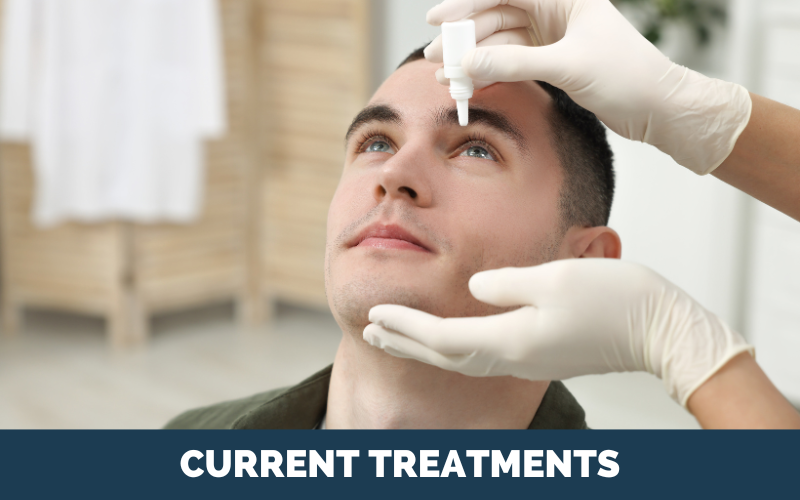Thyroid Eye Disease
How to build your TED healthcare team
With thyroid eye disease, you’ll need to see several healthcare providers, but there are many others you can include in your support team.
One of the realities of having thyroid eye disease (also called TED or Graves‘ eye disease) or other autoimmune health conditions is that you will most likely need to see a range of healthcare professionals at various points in your journey.
It is always a good idea to have someone to act like a ringmaster and manage all the different aspects of your care. For example, you might see a GP, a thyroid specialist, an eye specialist and a psychologist. They all help you within their scope of practice but communication between them can often be patchy.
Your GP is usually the one who liaises with your other team members but they may not have a complete record of the recommendations or treatments other members have initiated. However, stepping into the ringmaster’s role yourself and managing your own support team (if you are able) will help you:
- Gain a better understanding of your condition.
- Have a central record of communications from your team members to you and each other.
- Determine which treatments are right for you.
- Help you manage your health more holistically.
It also helps you to have a sense of empowerment and control over your condition rather than the other way around. You get to choose who is on your team and what role they will play in supporting you.
Who can I have on my core team?
Your thyroid eye disease healthcare team could include a variety of people, depending on your needs.
Your general practitioner (GP) can help you determine who you need to see. This decision is usually based on the symptoms that most concern you.
Your GP will be an essential member of your team so it is ideal that you have one that you like and trust. They can help you with many aspects of your care, including educating you about your condition and treatments and tracking your progress. Your GP can also set up a Chronic Disease Management Plan and/or a Mental Health Treatment Plan (via the Better Access Initiative) to help cover the cost of relevant allied health services.
An endocrinologist is a medical specialist who treats people with conditions that are caused by problems with endocrine glands and hormones, including thyroid problems, diabetes or menopause. If you have Graves’ disease or Hashimoto’s disease, you may already be seeing an endocrinologist when you develop thyroid eye disease symptoms. They can help you start your diagnosis and treatment journey.
Many people with TED symptoms first raise their concerns with their optometrist. An optometrist is a primary health provider who offers a variety of eye care services from eye tests, eyewear prescriptions and the detection and management of eye infections and diseases. If you have double vision from TED, your optometrist can also have glasses with corrective prism lenses made for you.
In Australia, optometrists are not classified as doctors, however, they will have a university degree in optometry. You do not need a referral to see an optometrist but they can refer you to an ophthalmologist or other relevant specialist if needed.
Ophthalmologists are medical professionals who specialise in advanced or complex eye conditions that go beyond the scope of care optometrists can offer. They have extensive training in identifying and managing eye diseases and performing eye surgeries. People with TED often have an ophthalmologist as a core member of their healthcare team.
Other team members to include
If you have moderate to severe TED, you may need radiation therapy conducted by a radiation oncologist. They specialise in treating multiple conditions including reducing inflammation behind the eye using a pain-free, highly targeted radiation beam directed from outside the body.
A neurologist is a medical doctor who specialises in diagnosing and treating diseases of the brain, spinal cord and nerves. They may be included in your team if the nerves around your eyes are affected by TED.
An oculoplastic surgeon is an ophthalmologist who operates on the various parts of the eye and the facial features surrounding the eye. Such surgeries are generally offered to improve the lasting appearance and comfort of your eyes, including correcting double vision issues.
Some people with thyroid conditions may see a rheumatologist. This is a specialist medical doctor who diagnoses, treats and manages conditions that affect the joints, muscles and bones, such as autoimmune arthritis, osteoarthritis, gout and vasculitis. As people with an autoimmune condition have an increased risk of developing other autoimmune conditions, it is common for rheumatologists to be part of a TED patient’s healthcare team.
You may want a psychologist or psychiatrist on your team. Both can treat a wide range of mental health issues using approaches like cognitive behaviour therapy. Both have studied extensively but a simple way to distinguish them is that a psychiatrist can prescribe medicine. They will work with you over a series of appointments and give you the coping tools you will need to handle all the stressful issues that come with having a painful, persisting and unsightly condition such as TED.
Some often overlooked but very useful members of your support team could be your specialist’s personal assistant, nurse practitioners, pathology nurses or health clinic nurses. Nurses are usually qualified to discuss medications with you and can answer many questions you would normally ask your doctor.
A general physician specialises in the care of patients with multiple or complex disorders. They can assist with the diagnosis of difficult problems, the management of interacting conditions or medications and the assessment and preparation of patients with serious medical issues requiring surgery.
An occupational therapist can help by finding ways to help you participate in the “occupations” of your daily life. This could be at your workplace but it could also be any task or activity you regularly engage in, such as shopping, cooking or socialising. They may suggest modifications to your physical environment or changing the activity to help you cope with eye pain, double vision or vision loss.
Your local pharmacist should be an essential part of your team. They can give you advice on your medications, answer questions about general medical concerns, keep track of your prescriptions and much more.
Team members from the wider community
Your support team doesn’t have to only include health professionals. Think about including the people closest to you, such as your partner, favourite relatives, close friends, carer or anyone else you know will help you with your day-to-day needs. They will give you the physical or emotional support you will need to help manage the bad days as well as the good ones.
Peer support groups are full of people going through similar challenges to you. They may meet in person or online The members can share tips for coping with things like vision issues and social stigma. You can share your experiences and ask questions in a friendly and non-judgemental environment. If you cannot find a support group for people with TED, you could consider joining a group with a wider demographic, such as people with thyroid conditions, vision issues or autoimmune diseases.
How do I decide who to include?
Your GP can help you choose your main team members. They will consider your needs and circumstances and refer you to the appropriate specialists. You can also ask people you trust such as a family member, friend or someone in your support group for their recommendations.
Choosing the right person to be in your team is a bit like hiring a new employee. First impressions and gut feelings do count. Sometimes you connect with somebody instantly and other times your instinct may tell you to steer clear.
It’s a good idea to create a shortlist of practitioners you are considering for various roles in your team. Check their credentials and see if they are members of professional associations. You can even give them a test run by booking an initial appointment with them before deciding if you want to come back to them regularly.
What if I don’t like them or agree with their opinion?
If your team is going to function effectively, each member needs to be someone you trust, who listens to you, takes you seriously and makes decisions with you and not for you. It is important that they are all aware of each other and are willing to work with each other.
If you don’t feel comfortable with that person or disagree with their approach you are perfectly entitled to seek a second opinion. You don’t have to use a specialist that your GP referred you to if you don’t want to. You also don’t have to stick to the same GP if you feel they are not meeting your health care needs.
It is quite acceptable to book an initial appointment with a different practitioner to see if they are a better fit for you. You are also entitled to have your records transferred to your new practitioner. Don’t be embarrassed about it, it is a common practice and they are unlikely to take it personally.
Where do I find people to include in my healthcare team?
Your GP will have lists of many other healthcare providers in your area.
Organisations such as the Australian Thyroid Foundation, Hormones Australia, Vision Australia and professional associations have a list of service providers in many areas. You can browse their websites or call their support phone lines.
There are many online directories, including the Federal Government’s healthdirect website, catering to different fields of health care. Often you simply need to enter your postcode and the site will automatically generate a list of service providers near you.
The people in your peer support groups can give personal recommendations for a range of practitioners. Keep in mind that we are all different and you may not like the person that your friend suggests.
How do I pay for it all?
Medicare provides a range of options to help you cover the cost of your health care. You can claim some or all of the cost of seeing a GP and many other healthcare providers. Sometimes you may have to pay the difference between Medicare’s scheduled fee and the provider’s actual fee.
If you have a pension or allowance from Centrelink, you may be entitled to a Pensioner Concession Card or a Health Care Card. These entitle you to discounts for many health services and products.
Australian federal and state governments provide an extensive range of support services and financial benefits for people with chronic conditions. You can also access other supports through local health and community organisations.
Private health insurance providers offer benefits that you can claim for services provided by many private healthcare practitioners. Your cover could include hospital and/or extras cover (for allied health services). It is important to check the details of your cover and see if it is giving you the best value for your current needs. You can access free health services through the public healthcare system.
Where to from here?
When you have so many people in your team you need to be organised. Keep a list of all your current medications and give it to all your relevant team members. Know when your appointments are and have a list of questions or points to discuss before you go. There are many smartphone apps and online resources available to help make your day-to-day life easier to manage.
If you find it too overwhelming to manage your team and appointments yourself, it is ok to get someone to help you. Close friends or family members may be willing to step into this role. Many larger health organisations have case managers who can advocate on your behalf. You could also find an independent patient advocate through some non-profit social organisations, patient organisations or online.
Finally, your team can include many different people all working to help you live well with thyroid eye disease but the most important member of your team is YOU. The more you know about your condition and utilise the people and resources around you, the easier your life will be.
If this content has raised feelings that concern you, you can contact:
- Lifeline: lifeline.org.au or call 13 11 14
- Beyond Blue: beyondblue.org.au or call 1300 22 4636
This information should never replace the information and advice from your treating doctors. It is meant to inform the discussion that you have with healthcare professionals, as well as others who play a role in your care and well-being.
Further resources
Australian Commission on Safety and Quality in Health Care: Australian Charter of Healthcare Rights (second edition). Understanding My Healthcare Rights A guide for consumers. https://www.safetyandquality.gov.au/sites/default/files/2020-12/11467_acsqhc_consumerguide_a4_web_fa01.pdf
Australian Patients Association: https://www.patients.org.au
Australian Thyroid Foundation: https://www.thyroidfoundation.org.au
Healthdirect Australia: All health services. https://www.healthdirect.gov.au/australian-health-services/all-services
Medical Republic. Patient advocates: a private affair. 2017 March 10. https://www.medicalrepublic.com.au/patient-advocates-private-affair/878




